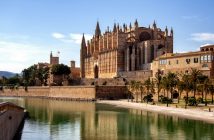When is a building not a building, but a town? I pondered this question at the Xuan Paper Town in Jingxian County, in China’s Anhui province, for it is the striking building, newly opened, dominating a predominantly rural landscape on the banks for the Wuxi river, of old rickety buildings and mountain backdrops.
It was only later I realised there is, in fact, a town beyond the main building, in spite of the building itself, graceful and striking in its disruptive innovation, that is the obvious draw. I felt as though I was entering the mouth of a whale, the effect made even more potent as it’s surrounded by a glass-still lake, which reflects the ribbed white concrete, luminescent in the orange glow of dusk. If it’s designed to showcase the region’s history of paper making, it’s certainly putting it on the map.
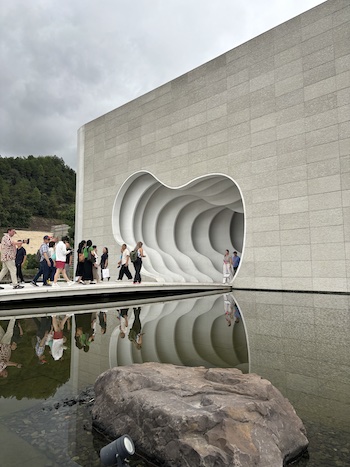 Once you enter, the ceilings are mountain-high, leading you along hushed corridors, over and around an architecture of cavernous white concrete, which looks as though it is continually moving, as the surrounding lakes reflect the light, rippling in the occasional breeze.
Once you enter, the ceilings are mountain-high, leading you along hushed corridors, over and around an architecture of cavernous white concrete, which looks as though it is continually moving, as the surrounding lakes reflect the light, rippling in the occasional breeze.
Covering an area of nearly 3km2, it’s divided into six main zones, which include displays of the different stages of paper making, all of which are performed in quiet theatrics –which appears almost balletic. Paper was first made in Lei-Yang by Ts’ai Lun, a Chinese court official, by mixing mulberry bark, hemp and rags with water, mashing it into pulp, pressing out the liquid and hanging the thin mat to dry in the sun. In this live exhibition, you witness the paper being mulched by foot, filtered by hand, and rolled out onto warehouse-size screens. The process is enthralling to behold.
I understand why the town has become a magnet for calligraphy and painting artists, offering visitors a unique and distinctive experience featuring the poetic beauty of Chinese aesthetics. It is one of the most extraordinary buildings I have ever visited.
This building oozes cathedral-like grace and nurtures a sense of calm that all visitors appear to respect. Everyone who enters falls silent. Traditional Chinese writing tools, such as paper, ink sticks, writing brushes, and ink slabs, have contributed to preserving not just traditional Chinese culture, but the world. This place is as much about the peaceful beauty of Anhui (the literal translation of the word) as it is about the mountains and rivers. If you visit Anhui, this is a must-see as much as Hungshau Mountain and the ancient villages.
From the sublime to the spicy. The food here certainly packs a punch. Famous for its salty, stinky fish, spicy pork dishes and hairy tofu, some dishes are usually stewed in an unctuous, barely identifiable, brown sauce. Ham is often added to improve the taste, and sugar candy added to gain freshness. To the vegans and the health-conscious, be warned.
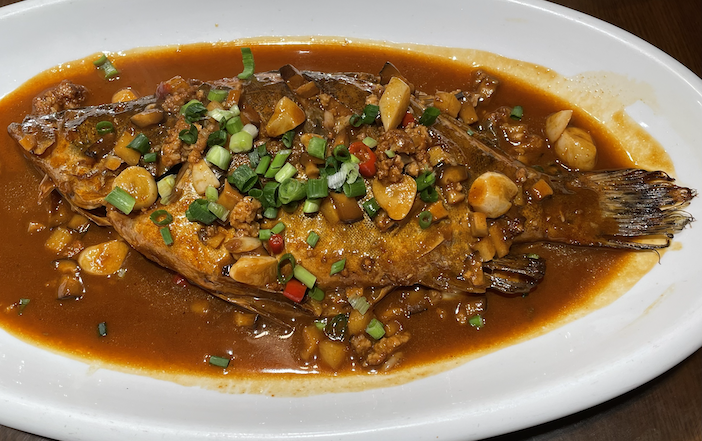
Fermented mandarin fish (photo courtesy of Creative Commons)
But when it comes to things culinary, this is the region to take tea. The teas are excellent, many of which have barely made it into western repertoires; Huangshan Maofang and Lu’an Guaplan green teas, and Qimen black tea, add an entirely new dimension to common understanding of tea, and although you can get many varieties of tea in the UK now, this tastes better than anything I have experienced in my local health food shop.
For the smallest province in China, you are spoilt for choice of UNESCO heritage sites, and there’s another entry into the Chinese pantheon that Anhui is known for; the Huizhou Ancient City, founded in the Qin Dynasty, is celebrated as the capital of Confucianism. About which everything you need to know is covered in the Huizhou Culture Museum which, like the Paper Museum, is best explored (and appreciated) slowly. Admittedly, not all exhibits have English translations, and Google and WhatsApp are restricted, so as fascinating as it is, the exhibits tend to be more visual candy as opposed to being able to gain a more intrinsic understanding about them.
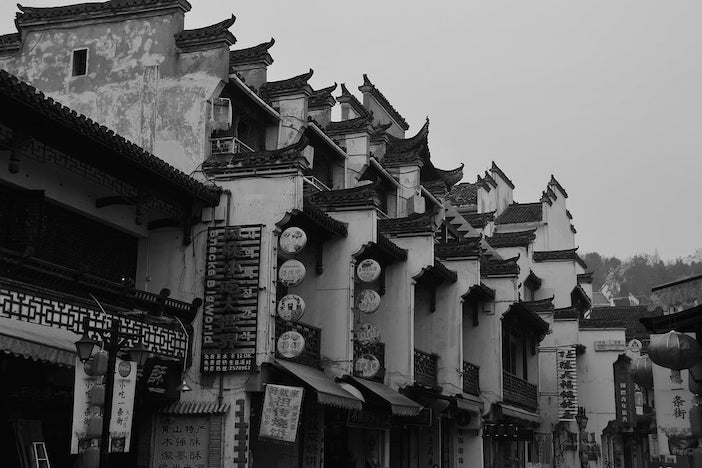
House fronts in Huizhou Ancient City (photo courtesy of PICRY)
But the exhibits are incredible and fascinating and you realize that here is a culture that spans far longer and is more profound than anything in European culture. The exhibits reveal a depth of wisdom, civilisation, and philosophy the Western world is only beginning to appreciate. In my lowly view, when the Chinese demolished this ancient culture, its spirit, and its value, was an act of self-sabotage much deeper than any Brexit – and, in putting the remnants behind glass and into museums this way, I am unsure if it is an attempt to show they appreciate their roots, or to reframe it as an attraction. Whatever the motivation, I left feeling enlightened by the experience, but more reflective and grateful we did not do the same to our own.
During the trip, I connected more with those I had travelled with, some of whom were travelling to China for the first time. We were all very different, like characters from an Agatha Christie novel, who overshared in turn, but the connection was that we were all well-travelled and curious. You need to be both to appreciate this experience fully. You are entering a culture that may leave you doubting your sanity at times, as the Chinese way is at once peaceful, loud and abrupt.
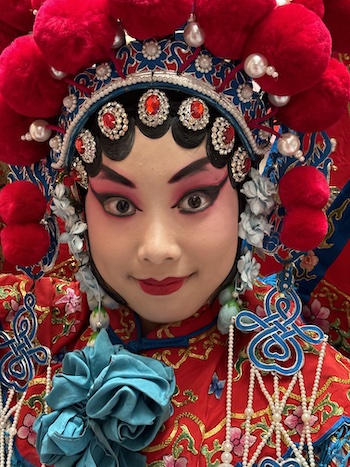 Anhui left me a little confused as to why the Chinese would want or need Western tourists, when they have billions of their own who enjoy their own country. But, if you visit, there is something to consider; this as an experience, not a holiday. It is a place that makes you think about yourself and your own culture. It is also (allegedly) one of the safest countries in the world because there is no theft. Safety, as the Portuguese Ambassador told me, comes at a price, and they are always watching – or you feel they are.
Anhui left me a little confused as to why the Chinese would want or need Western tourists, when they have billions of their own who enjoy their own country. But, if you visit, there is something to consider; this as an experience, not a holiday. It is a place that makes you think about yourself and your own culture. It is also (allegedly) one of the safest countries in the world because there is no theft. Safety, as the Portuguese Ambassador told me, comes at a price, and they are always watching – or you feel they are.
It is a culture that makes you appreciate their values and your own. Theirs is a respect for the collective; ours a respect for the individual. Theirs is respect for the family; ours is respect for the self. We neither respect our ancestors – although both cultures claim to do so. Still, the Brits kept their history while the Chinese, this region included, demolished theirs. We could genuinely learn from each other’s culture and not from our respective politicians.
Choose wisely what you visit so you aren’t left exhausted, feeling you have missed something, having rushed, seen, ticked and moved on. Though, doubtless, you will have. This is not the point of a trip to Anhui. It will teach you something beyond travel. Travel is not about the destination or the journey, it is about what you bring back. And this is the type of place that makes you return a wiser and more grateful person.
Sarah Tucker’s book Love Laterally: The Biography of Edward de Bono, is published by Aurora Metro, priced £19.99.
Photos by the author, unless otherwise stated


